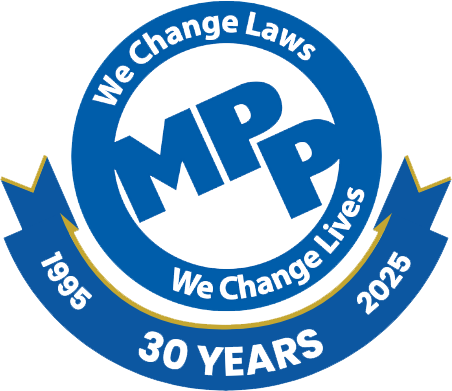- Take Action: Urge your state legislators to support a compassionate medical cannabis program!
Press Release
States Surpass $10 Billion in Tax Revenue from Legal, Adult-Use Cannabis Sales

FOR IMMEDIATE RELEASE
Thursday, January 6, 2022
Contact: Violet Cavendish
vcavendish@mpp.org
A new report from the Marijuana Policy Project shows that legalization states reported a combined total of $10.4 billion in tax revenue since sales began in 2014
Read the Marijuana Policy Project’s full report here
Washington, D.C. — The Marijuana Policy Project has released a new report on tax revenue generated from state-legal, adult-use cannabis since 2014 when sales began in Colorado and Washington state. As of December 2021, states reported a combined total of $10.4 billion in tax revenue from legal, adult-use cannabis sales, with more than $3 billion reported in 2021 so far (states have not yet reported revenue totals for the last one to three months of the year).
The report includes the tax structure for each state, total revenue generated each year, and additional information about how the revenue is being distributed to public services and programs. The full report is available here: mpp.org/cannabis-tax-revenue.
“States that have legalized cannabis for adults are reaping significant economic benefits. The legal adult-use cannabis industry has now generated over $10 billion in new tax revenue, and in many instances that revenue is being distributed to much needed public services and programs, including reinvesting in communities that were devastated by the war on drugs. This is in stark contrast to prohibition, which costs taxpayers billions of dollars each year to enforce,” said Karen O’Keefe, director of state policies at the Marijuana Policy Project.
Eighteen states have laws that legalize, tax, and regulate cannabis for adults 21 and older (the 2020 voter-approved adult-use legalization law in South Dakota was overturned by the state’s Supreme Court in November 2021). Eight of the laws were approved in 2020 or 2021, and in seven of those states, sales and tax collections have either not yet begun (or began within the last week).
In states with legal, adult-use cannabis sales, tax revenues can be allocated for social services and programs. This includes funding education, school construction, early literacy, public libraries, bullying prevention, behavioral health, alcohol and drug treatment, veterans’ services, conservation, job training, conviction expungement expenses, and reinvestment in communities that have been disproportionately affected by the war on cannabis, among many others.
Highlights include:
Alaska: Half of all adult-use cannabis tax revenue is invested in the Recidivism Reduction Fund and supports reentry programs for currently and formerly incarcerated individuals.
California: More than $100 million has been distributed to community groups and local nonprofit programs that benefit people adversely impacted by punitive drug laws.
Colorado: $471.9 million of the total revenue generated from cannabis taxes has been dedicated to improving Colorado’s public school system.
Illinois: In addition to investing 20% of adult-use cannabis tax revenue into mental health services, the state directs 25% of the funds to the Recover, Reinvest, and Renew Program, which supports local organizations in developing programs that benefit disadvantaged communities.
Michigan: For adult-use cannabis taxes collected in Fiscal Year 2020, the Michigan Department of Treasury reported in March 2021 that around $11.6 million will be sent to the School Aid Fund for K-12 education.
Washington: For every $1 billion in revenue collected from the cannabis sales tax, nearly $600 million is funneled into public health initiatives, including a fund that provides health insurance for low-income families.
###
Founded in 1995, the Marijuana Policy Project (MPP) is the nation’s leading cannabis policy reform organization. MPP has played a central role in passing dozens of cannabis policy reforms in states across the country, including 14 successful cannabis legalization campaigns, and also works to advance federal reforms.
